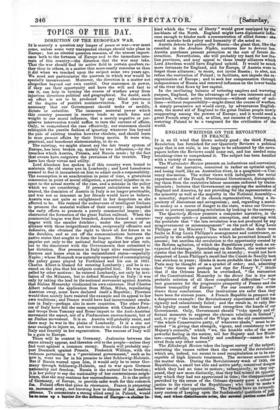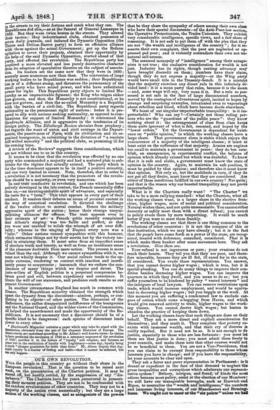ENGLISH WRITINGS ON THE REVOLUTION IN FRANCE.
IT is an ill wind that blows nobody good : the third French Revolution has furnished for our Quarterly Reviews a political topic that is not stale, is too large to be exhausted by the news- papers before the Reviews could come out, and has needed some breathing-time to comprehend it. The subject has been handled with a variety of success. The Westminster Review presents an industrious and convenient resume of the narrative' conceived in rather an optimist spirit, and losing itself, like an Australian river, in a quagmire—a Cur- rency discussion. The writer views with indulgence the social experiments of the French Provisional Government, distinguish- ing them from the restrictive labour measures enforced by trades- unionists ; lectures that Government on copying the mistakes of England and America, by not providing for the representation of the minority as well as the majority in the National Assembly—. a minority, deprived of its chosen representatives, being a de- pository of discontent and antagonism ; and, regarding a metal- lic money as a source of danger to the state, warns our Govern- ment to prevent impending revolution by looking to the currency. The Quarterly Review presents a cornpacter narrative, in the very opposite spirit—a pessimist conception, and starting with the postulate that "the late revolution was not produced by any misgovernment or mismanagement" on the part of King Louis Philippe or his Ministry 1 The writer admits that there were faults in King Louis Philippe's management and contrivance, es- pecially in the selfish appearances which he permitted himself to assume • but ascribes the revolution to the opportunity created by the Reform agitation, of which the Republican party took an un- expected advantage. Speculating on the future, the writer anti- cipates that the Republic must end in anarchy ; would not have despaired of Louis Philippe's recall had the Count de Neuilly been less stricken in years; thinks it more probable that the Count of Paris may be thought of as a symbol of order • and, admitting that "the times are perhaps not ripe for Henry V.," thinks that if the Orleans branch be overlooked, " the restoration of the Constitutional Monarchy in the direct line is the most probable solution of all these complicated difficulties "—" the best guarantee for the progressive prosperity of France and the future tranquillity of Europe." For our country the writer draws tlise conclusions. Our institutions are safer than they have been for sixteen years. A French Republic in prospect WaS a dangerous example : the Revolutionary experiment of 1830 bas signally and calamitously failed; and the result is, to rally Bri- tish loyalty round the throne and strengthen the hands of our Government. Only, Government should "take speedy and ef- fectual measures to suppress the chronic rebellion in Ireland"i and, to stop "the inroads of the Whigs on the old constitution," "the whole Conservative party, of whatever shade," must be re- united "in giving that strength, vigour, and consistency to her Majesty's councils," which we, the humble echo of the most powerful feeling in the nation tell her Majesty and her Minis- ters—respectfully, but frankly and confidently—cannot be de- rived from any other source." The Edinburgh Review takes the largest survey of the subject; narrating the causes rather than the events of the revolution; which are, indeed, too recent to need recapitulation or to be su.s- ceptible of high historic treatment. The reviewer accounts for the matter thus. During the Revolutionary week of 1830, the Republicans' a small but able and active party, conceived designs which they had no time to mature; subsequently, as they sin? posed, they saw more distinctly, that they had missed an opportu- nity which they had not appreciated in time ; the disappointmed provoked by the errors of the Orleans dynasty gave a colour of justice to the views of the Republicans; who tried to make 5 better use of other opportunities. The French have an extraordi- nary custom of keeping open the fundamental questions of pot ties, and when disUirhances_ arise, the several parties coins "Da' in the streets to try their fortune and catch what they can. The Republicans did this,—as at the funeral of General Lamarque in 1822. But they were twice beaten in the streets. They altered their tactics : they indoctrinated clubs, obtained possession of seven daily journals, and induced the Dynastic Opposition (the niers and Odilon-larrot party) to form an offensive alliance with them against the actual Government ; got up the Reform agitation to cover their projects, obtained their opportunity by the help of the said Dynastic Opposition, started ahead of that party, and effected the revolution. The Republican party has acquired a more elevated and less purely destructive character from its adoption of speculative theories on the subject of associa- tion. Its leaders are the same now that they were in 1830; scarcely more numerous now than then. The conversion of large working bodies to be Republicans was sudden ; their Republican- ism is of a different stamp, and threatens the permanency of the small party who have seized power, and who have substituted power for right. This Republican party objects to limited Mo- narchy as an impracticable figment: the King who reigns either does govern, and then the Monarchy is not constitutional, or he does not govern, and then the so-called Monarchy is a Republic with the burden of a civil-list. The Republican party regards nationality as the paramount right of nations: hence it is pre- pared to ally with nations seeking nationality, as opposed to com- binations for support of limited Monarchy : it contemned the Quadruple Alliance, and is aggressive in the tendencies of its foreign policy. The Edinburgh Review abstains from prophecy ; but regards the want of union and civil courage in the Depart- ments, the passiveness of Paris, with its civilization and its or- ganized bourgeoisie, in submitting to the dictation of "a resolute self-willed minority" and the political clubs, as promising ill for the coming time.
A review of the Reviews* suggests three considerations, which are not without use to us in this country.
It seems to be clear that the revolution was effected by no one party who commanded a majority and had a matured plan to sub- stitute for the regime that actually existed. The party which is for the time dominant appears to be in itself a positive minority, and one very limited in extent. Note, therefore, that in order to a revolution it is not necessary that the promotors of the revolu- tion should be a majoritys-or even very numerous.
In one trait conducive to revolution, and one which has been actively developed in the late contest, the French essentially differ from us,—an inextinguishable spirit of adventure, and especially the taste for a " lutte." This trait appears in every part of their conduct. It renders their debates an arena of personal contest in the way of oratorical emulation. It dictated the challenge of the twelve editors to mortal combat. Hence the military aggressive spirit of the nation ; hence their strange unsym- pathizing alliances for offence. The trait appears even in their estimate of art : a French critic recently complained that Alboni's singing was too facile and perfect, so that you were not enabled to relish the triumph of art over diffi- culty; whereas in the singing of Duprez every note was a "hate." Other nations cannot sympathize with this humour, which estimates things not by their merits but by the victory im- plied in attaining them. It must arise from an imperfect sense of absolute truth and beauty, as well as from an inordinate sense of the pleasure derivable from mere action. The process is more valued than the end. Although we cannot sympathize with it, we must not wholly despise it. Our social culture tends to the op- posite extreme, rendering us content with inaction and inordi- nately prone to compromise ; insomuch that we endure the con- tinuance of many things which we despise and detest. The juste-milieu of English politics is a perpetual compromise be- tween good and evil, between expediency and conscience. It blunts the will of our statesmen, and produces such results as our present Government.
In another circumstance England has much in common with France. The Republican minority obtained the strength which upset the dynasty from the discontent—aimless, perhaps, or con- flicting in its objects—of other parties. The discontent of the Reformers, the sullen disappointed indifference of the bourgeoisie and the National Guard, and the wilder views of the Communists, all helped the unsettlement and made the opportunity of the Re- publicans. It is not necessary that a discontent should be of a specific kind to be dangerous: each species of discontent lends power to every other.
* Blackwood's Magazine contains a paper which may take its stand with the Quarterlies, obviously from the pen of the eloquent Historian of Europe. The recent events are moralized according to Mralslison's well-known views: he claims to have predicted the revolution of 1848 as a necessary sequence of the revolution of 1830; ascribes it to the failure of " loyalty " and religion; and foresees no Peace but in the restitution of loyalty with Legitimacy—some day; loyalty being a much "cheaper guarantee for order than force." Mr. Alison forgets that dog- matic loyalty is a matter of feeling and habit—that it cannot be enforced, but Oa only happen.



























 Previous page
Previous page